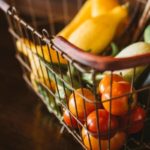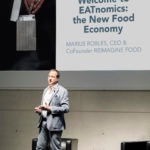Technology is transforming the food industry. Scanners to determine food composition and menu creation using smartphone data are two of the trends that are taking off.

The FoodTech sector set new records in 2015. Nearly $6 billion were invested in this industry, 60% of which went to new food delivery startups, according to CB Insights. Although this year’s numbers aren’t as spectacular as in the past, a trend is emerging in grocery delivery. The amount spent on groceries in the U.S. surpassed the amount spend on eating out.
Marius Robles, the CEO of Reimagine Food, a platform for technology consulting and food startup accelerator, gives the U.S. company Blue Apron as an example of the rise of FoodTech. This company delivers eight million food kits every month and has gotten people in the U.S. back into the kitchen. Bill Gates is another example of this trend, allocating $108 million last year to Impossible Food, a food startup focused on biotechnology.
What is happening in the food industry?
Marius Robles, speaker at the South Summit entrepreneur meeting in Madrid, indicates that “customers are asking for highly personalized service and want to interact more with food.”
An “Uberization” is taking place in the restaurant business, he says, which makes it possible to order from the best restaurants and have a hot meal at home in 30 minutes, or to receive the exact ingredients you need if you want to make the recipe in your kitchen.
Thanks to technology, the way we eat will be more aligned with our genome
Technology has affected food from all angles and in all locations. Just Eat is partnering with the company Starship to deliver orders with robots in London and drones have started to deliver food in Singapore.

Marius Robles, speaking at the South Summit entrepreneur meeting in Madrid
Big data for cooking
Big data and artificial intelligence are also part of the FoodTech revolution. There are examples like IntelligentX, which uses artificial intelligence to create custom made beer based on the customer’s preferences.
While large multinationals are betting on big data, IBM Watson launched Chef Watson, which experiments with 20,000 recipes, 1,000 chemical components of food and 2,000 hypothetical customer preferences. It is pairing thousands of data to test new recipes.
Robles inists that technology “will not only be focused on finding out your preferences. It will also pay attention to your health.” The menu of the future will not only change at home, but also when you go to a restaurant. Your smartphone to detect possible eating disorders or if you need more carbohydrates, for example.
Thanks to technology in which data will redefine how it relates to our diet and health
Food transparency is the goal of TellSpec CEO Isabel Hoffmann. At the South Summit, she spoke of how important it is for consumers to know where their food comes from in a globalized world. Hoffman created a scanner that tells users the amount of fat, carbohydrates, fiber, calories and sugar in food, and whether or not it contains gluten.
The scanning engine she and her team developed also allows users to check the security and authenticity of food. Hoffmann stressed in Madrid that data “are transforming the food industry and allow for fraud detection in food that could cause health problems.”
Are we going to eat better?
Hoffmann described what she called a “clean food revolution” thanks to technology in which data will redefine how it relates to our diet and health. Robles notes that consumers are willing to pay three times more for a product if they know its origin.
“Thanks to technology, the way we eat will be more aligned with our genome,” says Robles, who also maintains that machines will help us take care of ourselves. “The refrigerator won’t open, for example if it detects that you have had too much sugar. It will all be connected.”
The Reimagine Food CEO concludes: “A 21st Century map of how we will eat will show companies we haven’t even heard of.” The FoodTech revolution has only just begun.